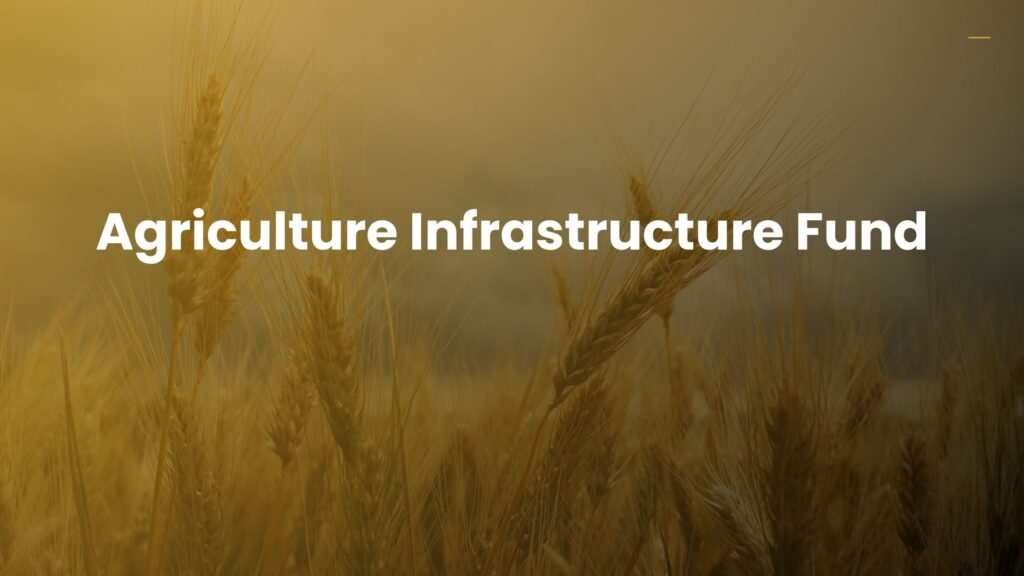Expanding the horizons of India’s agricultural future : Cabinet’s approval for Agriculture Infrastructure Fund
In a significant move towards bolstering India’s agricultural sector, the Union Cabinet, under the leadership of Prime Minister sri Narendra Modi, has given its approval for the progressive expansion of the Central Sector Scheme of financing under the ‘Agriculture Infrastructure Fund’ (AIF). This decision is aimed at making the scheme more inclusive, impactful, and attractive to a broader spectrum of beneficiaries, thereby furthering the development of a robust agricultural infrastructure ecosystem in the country.
Key initiatives under the expansion of AIF,
The expansion of the AIF scheme introduces several strategic measures designed to broaden the scope of eligible projects, integrate additional support mechanisms, and align with other significant agricultural initiatives. These steps are expected to significantly enhance the productivity and sustainability of the agricultural sector.
1. Viable farming assets: building community farming capabilities
One of the key measures under the expanded scheme is the inclusion of viable projects for building community farming assets. This move allows all eligible beneficiaries to create infrastructure that supports community farming. The development of such assets is crucial in improving the overall productivity and sustainability of agriculture by enabling the collective use of resources, sharing of knowledge, and enhanced farming practices. The focus on community-driven projects also ensures that the benefits of infrastructure development are shared across multiple farmers, thereby fostering a more inclusive agricultural environment.
2. Integrated processing projects: enhancing the value chain
Another significant inclusion is the allowance of integrated primary and secondary processing projects under the AIF scheme. However, standalone secondary projects will not be eligible and will instead be covered under the Ministry of Food Processing Industries (MoFPI) schemes. The integration of processing projects under AIF is expected to create a more seamless value chain in agriculture, where the raw produce can be processed and packaged more efficiently. This not only adds value to the agricultural products but also reduces wastage and ensures better returns for farmers.
3. PM KUSUM component-A: promoting sustainable clean energy
The expansion also allows for the convergence of Component-A of the PM-KUSUM (Pradhan Mantri Kisan Urja Suraksha evam Utthaan Mahabhiyan) scheme with the AIF. This alignment is targeted at promoting sustainable clean energy solutions within the agricultural sector. By allowing farmer groups, Farmer Producer Organizations (FPOs), cooperatives, and panchayats to access AIF for projects that align with PM-KUSUM’s objectives, the government is encouraging the adoption of renewable energy sources, such as solar power, in farming operations. This not only reduces the carbon footprint of agriculture but also provides farmers with a reliable and cost-effective energy source.
4. NABSanrakshan: Strengthening financial security for FPOs
To enhance the financial security of FPOs, the expansion of the AIF scheme includes extending credit guarantee coverage through NABSanrakshan Trustee Company Pvt. Ltd., in addition to the existing coverage by the Credit Guarantee Fund Trust for Micro and Small Enterprises (CGTMSE). This expanded credit guarantee framework is designed to improve the creditworthiness of FPOs, thereby encouraging more investments in agricultural infrastructure projects. By mitigating the financial risks associated with such investments, the government aims to attract more private sector participation, which is crucial for the large-scale development of agricultural infrastructure.
AIF’s impact so far: A testament to success
Since its inception in 2020, the Agriculture Infrastructure Fund has played a pivotal role in transforming India’s agricultural landscape. To date, the scheme has supported the creation of 6,623 warehouses, 688 cold stores, and 21 silos projects, adding approximately 500 lakh metric tonnes (LMT) of storage capacity across the country. This includes 465 LMT of dry storage and 35 LMT of cold storage capacity. The additional storage facilities have significantly reduced post-harvest losses, with 18.6 LMT of food grains and 3.44 LMT of horticulture produce saved annually.
The financial commitment under the AIF has been substantial, with Rs. 47,575 crore sanctioned for 74,508 projects, mobilizing an investment of Rs. 78,596 crore in the agricultural sector. Of this, Rs. 78,433 crore has been mobilized from private entities, highlighting the significant role of the private sector in the scheme’s success. Moreover, the infrastructure projects sanctioned under AIF have generated more than 8.19 lakh rural employment opportunities, contributing to the economic upliftment of rural communities.
The road ahead: Driving growth and sustainability in agriculture
The recent expansion of the AIF scheme is set to further accelerate the growth of India’s agricultural sector. By broadening the scope of eligible projects and integrating additional support mechanisms, the government is not only enhancing farm incomes but also ensuring the overall sustainability of agriculture in the country. These measures underscore the government’s commitment to the holistic development of farm infrastructure, which is vital for the long-term growth and resilience of India’s agricultural sector.
As the AIF scheme continues to evolve, it promises to be a cornerstone of India’s agricultural policy, driving innovation, fostering collaboration, and creating a more sustainable and productive agricultural ecosystem.










